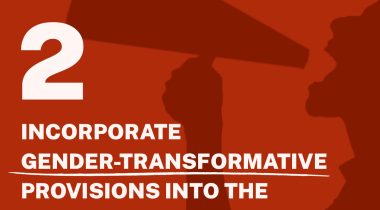Ignacia Pinto and Professor Sue Himmelweit ■ The UK Chancellor could have taxed income from wealth properly, strengthened our public services and invested in social infrastructure but chose not to

We’re pleased to share this blog post written by Ignacia Pinto and Professor Sue Himmelweit from the Women’s Budget Group.
In his 17 November speech, the UK Chancellor Jeremy Hunt sought to demonstrate fiscal responsibility after the turmoil created by his predecessor’s “mini-budget”. He announced tax increases in the short term and a series of cuts to public services in the medium term. At the Women’s Budget Group, we argue that a healthy economy needs strong and well-funded public services, supported by a progressive taxation system.
Taxes and public spending are important ways to redistribute resources and reduce gender inequalities. Due to caring responsibilities at different stages of life, women rely more on public services and social security, have lower incomes and lower levels of wealth. The Autumn Statement was a missed opportunity to invest in public services and reform the tax system into a fairer regime which taxes income from wealth, including capital gains, at the same rate as wages so that those with the most contribute the most.
The Chancellor announced that tax allowances on income from dividends and capital gains will be cut, meaning that more people will start paying taxes on these types of income and those that pay such taxes already will pay a bit more; but proportionately it will impact most on those with a little income from dividends and capital gains. Reducing such allowances is a small move in the right direction, but truly equalising the taxation of income from wealth with income from employment would require that they be taxed at equal rates. This would not only move us towards a fairer tax structure, it would raise a considerable amount of money: £12 billion annually by 2026/7, far more than the £435 million that the Chancellor’s reductions in tax allowances will raise.
Another decision was to freeze a number of tax thresholds, including those for income tax and national insurance contributions until 2028, and to reduce the threshold for the 45% rate of income tax from £150,000 to £125,000. Income tax is progressive and the fairest tax we have, so a good source of additional revenue. But cutting or freezing thresholds, like reducing tax allowances, means that everyone above a particular threshold pays the same extra amount: both those with earnings just above any threshold and those earning far above it. A more progressive approach to raising extra revenue from income tax would have been to increase tax rates progressively.
The other half of Hunt’s plan to ‘balance the books’ is to cut public spending from 2025 onwards. We believe that this is a misguided decision which will have disastrous consequences now and in the future because our public services, already at near breaking point from previous cuts, should be seen as “social infrastructure”. The benefits of social infrastructure, like other forms of infrastructure, go beyond its direct users and therefore requires collective investment if we are all to flourish.
But in the national accounts, spending on day-to-day expenditure, such as on health and social care, is not counted as investment. Investments are typically one-off expenditures on a physical project, a bridge or a railway line, for example. But these are investments, not because they are one-off expenditures, but because their benefits accrue in the future. This is true of much spending on public services too; it is investment because its benefits lie largely in the future. Not counting them as investment results in a bias towards those one-off physical forms of infrastructure and a neglect of our social infrastructure. And that bias is gendered in two respects: that women benefit particularly from investment in social infrastructure and are also more likely to be employed in public services than in building bridges. The macho view that investment consist of spending on physical infrastructure projects creating jobs for men should be challenged.
WBG’s research has shown that investment in social infrastructure makes economic and fiscal sense: it creates more jobs than the same investment in construction (physical infrastructure), narrowing gender gaps in employment and pay, while at the same time freeing up those doing unpaid care work to take employment. In the longer term, this type of investment also results in higher productivity, higher pay, and potentially lowers spending in the future on benefits and the public services that remedy the problems that lack of preventative care creates. Investment in social infrastructure is also sustainable and a contribution to creating a greener, more caring society, and an example of how addressing inequality and the climate crisis should guide economic and fiscal policy.
Image attribution: HM Treasury and The Rt Hon Jeremy Hunt MPPhotographer: Andrew Parsons, OGL 3 http://www.nationalarchives.gov.uk/doc/open-government-licence/version/3, via Wikimedia Commons
Related articles
The elephant in the room of business & human rights
UN submission: Tax justice and the financing of children’s right to education
14 July 2025
One-page policy briefs: ABC policy reforms and human rights in the UN tax convention
Tax justice pays dividends – fair corporate taxation grows jobs, shrinks inequality
The millionaire exodus myth
10 June 2025

Lessons from Australia: Let the sunshine in!
UN Submission: A Roadmap for Eradicating Poverty Beyond Growth
A human rights economy: what it is and why we need it

Do it like a tax haven: deny 24,000 children an education to send 2 to school


